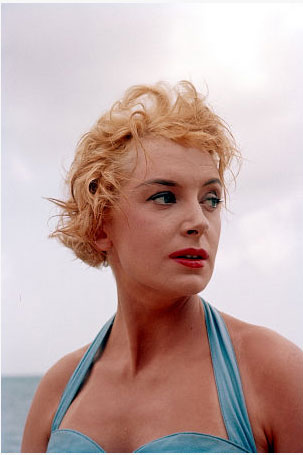Need a reprieve from news of the writers' strike and gossip about the 20-something drama princesses? Just close your eyes and think of Deborah Kerr.
To say I had a special relationship with her would be a total lie as well the honest truth. She died just over one month ago of complications related to Parkinson's Disease (b. September 21, 1921, d. October 16, 2007). I have needed this month to process my feelings about the collective and personal loss of such a touching performer and artist. This is complicated still further by the irony that my father (b. September 28, 1916, d. August 31, 2007) also recently died and of complications related to his Parkinson's Disease. It brings home the fact that we are losing our earthly ties to the World War II generation and to an amazing era of image and film making that we will never know the likes of again.
David Denby's short, but beautiful, piece on "the red-haired Scottish beauty" and "consummate actress" in the November 12, 2007 issue of The New Yorker captures something essential about her. "Deborah Kerr made maturity exciting. There's no one remotely like her today."
The internalized representations and relationships we have with our cultural icons -- especially the ones who can go back and forth so effortlessly from looming regal giants in period costume to heartbreaking fragile humans in contemporary conundrums -- take up more psychic space than we may realize. Until the moment we lose them. A close friend of mine keenly observed, "You held it together so beautifully when your father died, but when you heard about Deborah Kerr, you lost it." It's true. At first, I was embarrassed to admit it, but what she made me feel was worth every tear I shed.
(Image courtesy of IMDB.)
Deborah Kerr was the kind of actress who could make the waterworks flow but just as easily inspire the most natural kind of smile to cross your face. Her performances were every bit as true in glorious Technicolor (The Grass Is Greener, The Prisoner of Zenda) as they were in gritty black and white (Separate Tables, Edward My Sun). The list of her body of work (Night of the Iguana, The Sundowners, An Affair to Remember, From Here to Eternity, Tea & Sympathy, Julius Caesar, Young Bess, Black Narcissus, The King & I, et al) is simply stunning. Another aspect of her brilliance was that, even on screen, you felt must be as equally lovely off.
She could stand shoulder to shoulder with screen lions like Richard Burton and Ava Gardner in Night of the Iguana and take total command of a more subtle role. Then, just as she was about to sprint passed them following some of those magnificent soliloquies, she would return to interact and make them come off even better.
She masterfully adapted herself and beautifully played off most of the iconic leading men of her day -- Cary Grant, Robert Mitchum, Clark Gable, Burt Lancaster, Spencer Tracy, Stewart Granger, David Niven, Gary Cooper, Frank Sinatra, Gregory Peck, John Mills, James Mason and Kirk Douglas. She made a total of five films with Niven, four with Mitchum and Mills, and three with Lancaster, Mason, Granger, Grant and her raven-headed counterpart Jean Simmons.
It's so very interesting, but not surprising, how many times Deborah Kerr worked with the same actors. They couldn't get enough of her, nor did we.
Farewell. Well done.